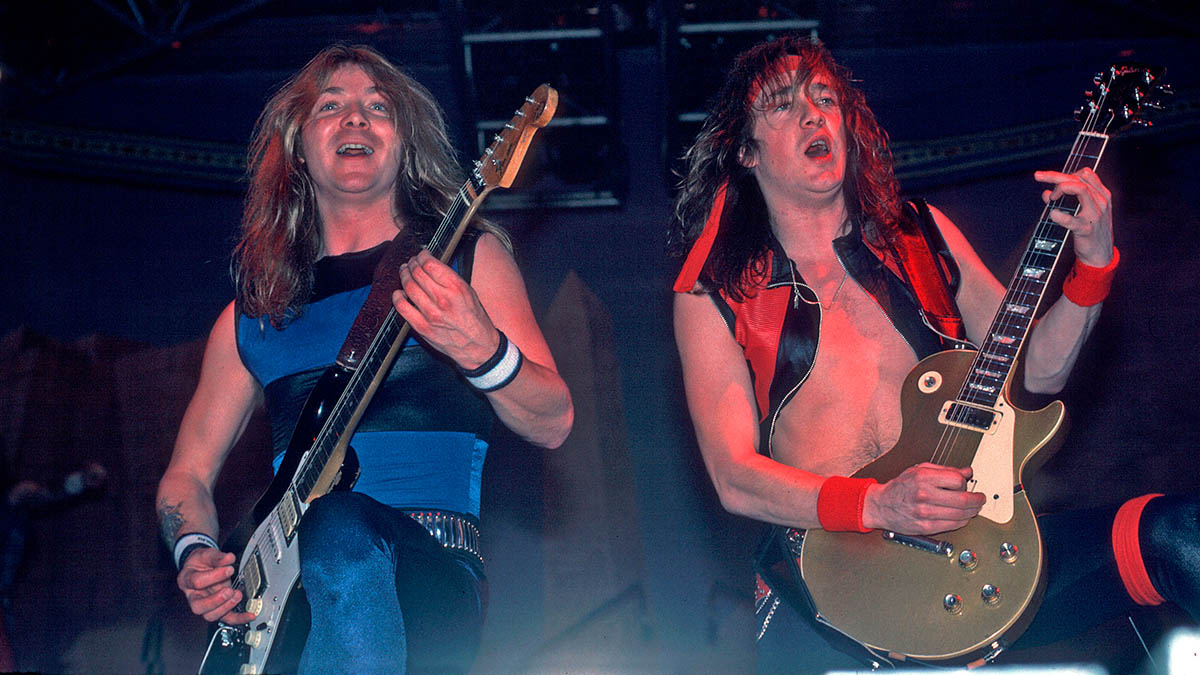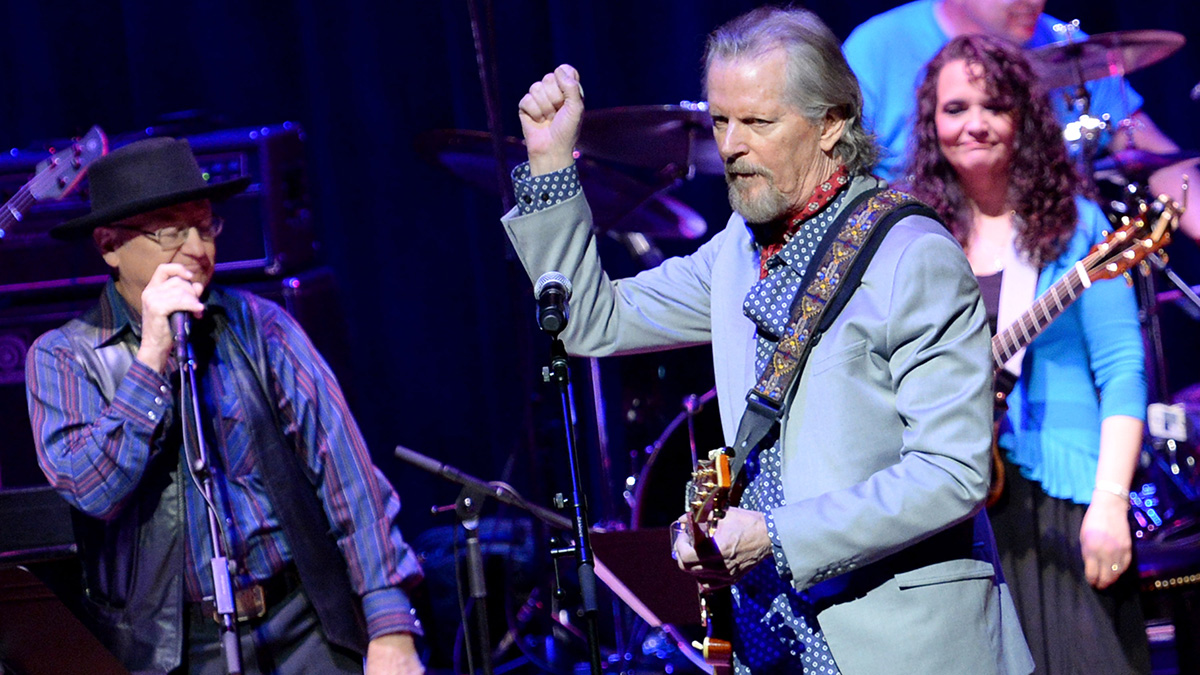“I was extremely hungover. The producer called me into the studio and had me sit at the desk and do the solo. I was really in pain, but I pulled it off”: Adrian Smith on how Iron Maiden went beyond epic with Powerslave
With Powerslave, Iron Maiden took their sound and supersized it – and Adrian Smith took a hungover guitar solo in front of Robert Palmer, and somehow totally nailed it

Going into 1984, Iron Maiden were on the precipice. They’d gone from a raggedy-assed quasi-punk outfit posing as a metal outfit to a certifiable powerhouse bursting with pomp and circumstance.
Part of that shift was due to Adrian Smith, who, after replacing Dennis Stratton in 1980, cozied up alongside holdover Dave Murray. It was all too easy, as Smith, like Murray, was a real-deal gunslinger who got off on plugging his ax directly into a Marshall and diming it.
Smith’s blues-inspired, gentle arpeggios and modal stylings were the proverbial yin to Murray’s Hendrix-worshiping, legato yang. They’d rattled off two albums together, Killers (1981), The Number of the Beast (1982) and Piece of Mind (1983), that proved it. But now it was time to firmly cement themselves as halcyon greats.
And so, after Christmas of ‘83, Maiden hauled ass to the Channel Islands in Britain to begin writing their fifth album, Powerslave, with world domination on the brain. The pressure was surely ratcheted up, but if that bothered Smith, he doesn’t let on.
“As far as our intent, it was still about the song,” Smith tells Guitar World. “We’d just write the song, and then Dave and I would worry about the solos after.”
Despite Smith’s oversimplification, solos were critical. On Powerslave, there are 14: seven by Smith and seven by Murray. With those solos came dueling harmonies and raging bravado, but perhaps unsurprisingly, little thought was put into it.
“Dave and I rarely spoke about it,” Smith says. “I’d started writing more, but Steve wrote many of the harmonies. Steve wrote the harmony sections on Aces High, which was typical. When I’d write, I never had harmony guitars; I arrived at things differently. So it came down to Dave and I knowing each other rather than talking.”
Get The Pick Newsletter
All the latest guitar news, interviews, lessons, reviews, deals and more, direct to your inbox!
Murray and Smith never riffed harder or soloed more melodically than on Powerslave, where guitar magic was conjured, secret sauces were crafted and Kool-Aid was drunk. Of course, with a guitar-loving producer like Martin Birch twirling the knobs at Compass Point Studios, that was never in doubt. “Martin worked with all the giants,” Smith says. “When he suggested something, you took notice.”
As for how Birch impacted him directly, Smith says, “Considering all he’d done, it was a matter of trying to impress him and wanting to do a good job. You were probably doing pretty well if he thought highly of you.”
With the heroics heard on songs like 2 Minutes to Midnight, Powerslave and The Rime of the Ancient Mariner, odds are that Birch was indeed impressed. But even if he wasn’t, there was an unexpected guest who was.
“As we were working on Powerslave, AC/DC came into the studio to work on their new album. I remember Bruce [Dickinson] and I got to talking with Brian Johnson, and we played him the final version of 2 Minutes to Midnight. He seemed quite impressed. Brian seemed very positive about it, but maybe he was just being polite!”
Johnson aside, 2 Minutes to Midnight is a rager featuring Murray and Smith peeling off righteous solos. Smith says the song “originated from a demo done on a four-track recorder.” Then there was Rime of the Ancient Mariner, which Smith says was “recorded in sections, as we couldn’t play it all the way through because it was 13 minutes long.”
But neither of those tracks stood out like Powerslave did for Smith, who laughs, saying, “I remember doing the solo for Powerslave. I was extremely hungover. We were a bunch of young guys, and we’d go out at night and party very hard. We were out until three in the morning, and I went home thinking, ‘We’re not working tomorrow, we’ve gone too hard.’
“But at 10 in the morning, Martin – who partied harder than any of us – called me into the studio, and he was sitting there with Robert Palmer – the Addicted to Love guy. He had me sit at the desk and do the solo. I was really in pain, but I pulled it off. Funnily, it’s my favorite.”
Of the seven solos Smith signed his signature to, of note is the sweet yet rage-filled tone he harnessed, which shockingly, he did without much help. “I was using Lado [Earth] guitars,” he says. “All I paired them with was a 100-watt Marshall and maybe an [Ibanez] Tube Screamer. Believe it or not, that was it as far as the guitar sound of Powerslave goes.”
Despite the partying, AC/DC intrusions and hung-over solos – and before the world would see to it that Powerslave would race to Number 21 on the Billboard 200 and go platinum – the vibe at Compass Point was that Maiden were sitting on a stunner.
Even an overly critical guy like Smith knew it. “I just plowed ahead and played my guitar,” he says. “I didn’t think about it, but knew we had something. I was too close to it. I knew it was good, but there was no being objective.”
I wasn’t married, I had no kids, but I needed a break. The whole process pushed a few people over the edge
With 40 years having passed and the wounds of self-analysis closed, Smith offers up his final word on Powerslave, that album that put Maiden on the map.
“It was important,” he says. “We were out for 13 months supporting it, and maybe that was too much. That affected Bruce badly. Singing for 13 months straight was hellish. We had no life other than touring for Powerslave. I wasn’t married, I had no kids, but I needed a break. The whole process pushed a few people over the edge.
“Don’t get me wrong – we had good times, and Powerslave was important, but in the end, it was a bit too much, which led to a lot of changes after.”
- Powerslave is out now via Rhino.
Andrew Daly is an iced-coffee-addicted, oddball Telecaster-playing, alfredo pasta-loving journalist from Long Island, NY, who, in addition to being a contributing writer for Guitar World, scribes for Bass Player, Guitar Player, Guitarist, and MusicRadar. Andrew has interviewed favorites like Ace Frehley, Johnny Marr, Vito Bratta, Bruce Kulick, Joe Perry, Brad Whitford, Tom Morello, Rich Robinson, and Paul Stanley, while his all-time favorite (rhythm player), Keith Richards, continues to elude him.





![[from left] George Harrison with his Gretsch Country Gentleman, Norman Harris of Norman's Rare Guitars holds a gold-top Les Paul, John Fogerty with his legendary 1969 Rickenbacker](https://cdn.mos.cms.futurecdn.net/TuH3nuhn9etqjdn5sy4ntW.jpg)





